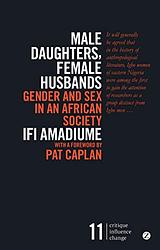Male Daughters, Female Husbands by Ifi Amadiume
"Male Daughters, Female Husbands" is an anthropological exploration of gender roles and power dynamics within the Igbo society of Nigeria. The book challenges traditional Western notions of gender and sexuality, focusing on the concept of "female husbands" - women who assume the roles and responsibilities typically associated with men. Through extensive research and personal narratives, the author examines the historical and cultural context of these gender roles, shedding light on the complex intersections of gender, power, and identity in Igbo society.
The 5108th greatest book of all time
Ranking Details:
Our ranking system awards points to books based on their appearance and position on curated lists. Here's how it works:
Unranked Lists: For lists without specific rankings, each book receives points equivalent to the list's weight. This approach recognizes the book's inclusion on prestigious lists.
Ranked Lists: Books on ranked lists receive points in two ways:
- Base Points: Initially, every book is awarded points equal to the list's weight, acknowledging its significance.
- Bonus Points: Additionally, books earn bonus points based on their ranking. The total bonus pool, equal to 100% of the list's weight, is distributed among the books, with higher-ranked books receiving more points.
Exponential Distribution: The distribution of bonus points follows an exponential model. This means the top-ranked book (#1) receives significantly more bonus points than those further down the list (e.g., #100). Our algorithm ensures that higher placements are rewarded more generously, reflecting the achievement of a top rank on any given list.
This scoring system ensures that each book's ranking reflects both its presence on multiple lists and its positions within those lists, providing a comprehensive measure of its acclaim and popularity.
Total Points: 102
Since this book was first published in 1987, there is a penalty of 20.8%. The age adjusted score is 80.78.
This is to prevent newer books from reaching super high on the ranked list of the greatest books of all time. The greatest books should also stand the test of time.
- score: 102 -- Africa's 100 Best Books of the 20th Century (Weight: 102)

